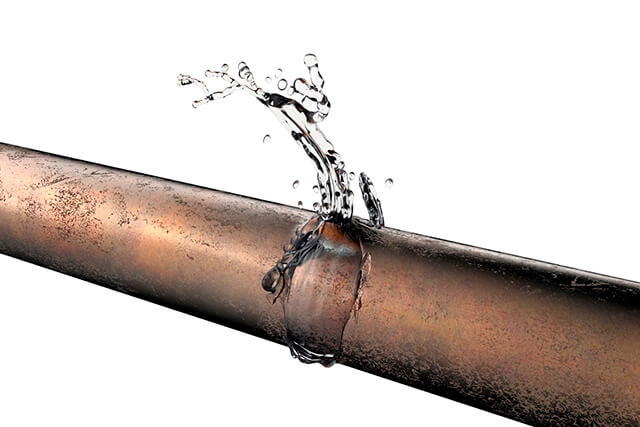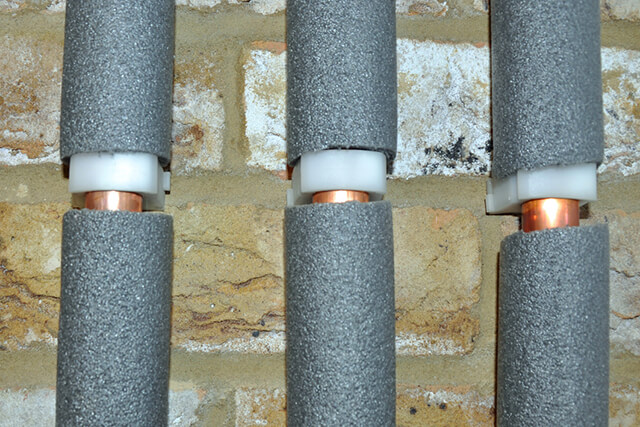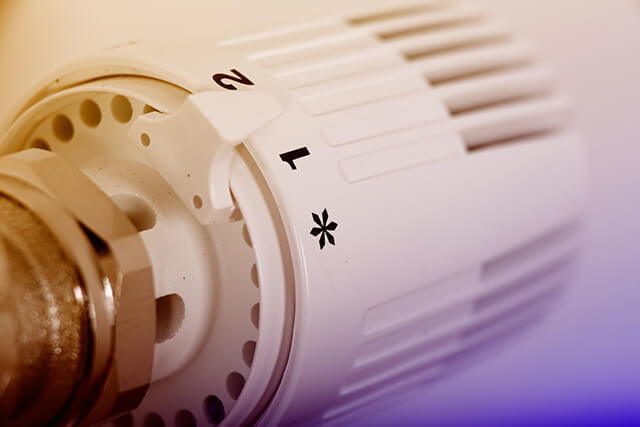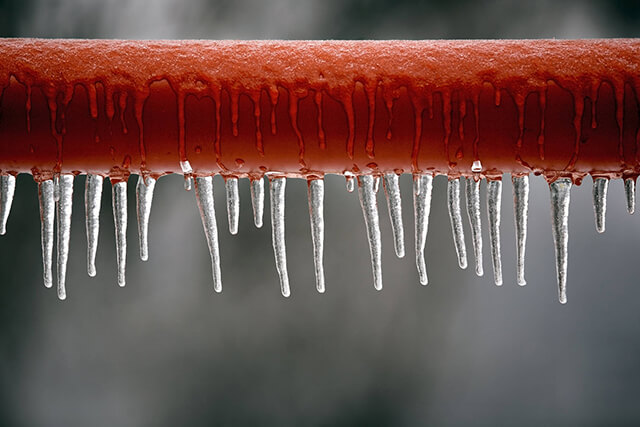Water ingress or leaks are a real danger to any holiday let and can cause a headache for holiday home owners. In this blog our property experts provide some helpful tips on how to stop pipes from freezing during the colder months.
How to stop pipes from freezing this Winter
Use the quick links below to navigate to a particular topic or read on to find out more.
How to avoid burst pipes

Insurance companies say that one in four domestic claims are for “escape of water”.
The damage caused by water can cost hundreds, or even thousands of pounds to repair. Although the cost will depend on the location of the leak, the amount of water that has ‘escaped’, and how long it was leaking before being discovered.
The arrival of the winter months can sometimes cause holiday home owners problems. Darker days and nights with increased rainfall and dropping temperatures – with the potential for frost or even snow – bring challenges for properties.
Particularly older homes with less contemporary pipework and heating systems. It can also make undertaking routine maintenance tricky!
If you are looking to take advantage of the quieter winter months to titivate and update your property, be mindful of the difficulties inclement weather can bring.
Build a plan with essential winter maintenance broken down into bite-size chunks, and save yourself time, hassle and money, by keeping an eye on the weather forecast for dry periods, when smaller jobs can be completed.
In terms of colder spells, whenever we experience a dip in temperatures, it invariably raises questions. Such as “How to stop pipes from freezing?” and further to that “How to avoid burst pipes?”.
So, here are some ways you can prevent burst pipes and protect your holiday let this Winter.
How to stop pipes from freezing

To stop pipes from freezing and subsequently prevent burst pipes, a simple but effective option is to install pipe lagging. Pipe lagging are foam sleeves that are readily available in most hardware shops (like Screwfix) and easily installed.
If your pipes are hidden, obviously this job becomes more complex. But in essence, by putting a foam jacket around the central heating or water supply pipes, you are insulating them. This extra padding will allow them to retain any warmth and stop them from getting cold to the point of freezing.
Keep your (central) heating on

In order to retain some heat in the property and most importantly in the heating system or the pipes internally, we recommend keeping your heating running through the winter months.
By maintaining a steady temperature of approximately 13 degrees Celsius, your holiday property’s pipework will never drop to sub-zero temperatures. This drop in temperature could cause pipes to freeze and potentially burst. While this results in heating costs, it obviously helps avoid damage, repairs, and an awful lot of stress.
Turn off your water supply and drain the system
If you would prefer not to keep your holiday let heated throughout winter, another way to minimise the risk of flooding is to stop the water supply to your property. You can do this via the stop tap, and then drain the water in your pipes.
With no water circulating in the system, your pipes and heating system will sit dormant, but safe from freezing.
Of course, our recommendation would be to maintain a consistent and steady warmth of around 13 degrees Celsius. As this would keep traditionally built properties dry and in good health.
Arrange for property checks to be done regularly
If you are not near your holiday home, it is crucial that there is somebody close who can attend your property. We recommend inspecting your holiday let every 2-3 weeks. Many insurance companies will insist that this regular check is done through the quieter months.
Here at Helpful Holidays, we have many trusted caretakers that can visit your holiday let every week or fortnight. We ask them to carry out a thorough property check that will put your mind at ease.
Our property experts recommend keeping your heating system repairs and maintenance up to date with annual checks. If you are working with an older, less reliable boiler, more frequent checks would be beneficial. And, if your boiler is more than 15 years old, it is worth looking for a replacement. A more efficient boiler will use less fuel and thereby save you money!
For more information on boiler maintenance read our blog.
What to do when pipes freeze?

If you suspect your pipes have frozen, the first course of action is to locate and turn off your internal stop tap. This should limit the volume of water flowing through the system which might escape in the event of a burst pipe.
Similarly, if you have a tank in your roof space and this has a tap, turn it off! Switch off your central heating and spend some time looking for any visible cracking or damage to pipes you can access.
Pipes can be in walls and under floors, so they can’t always be easily accessed. If you are in any doubt or you find damage to your pipes, call a plumber. If no damage is visible and you feel confident, you can try to thaw the pipes, get some towels and buckets so that you are prepared.
It is also worth moving any furniture or valuable items away from the frozen pipes to avoid damage if the water escapes. Open any taps close to the area where the pipes may have frozen, as this will help relieve pressure when the pipe thaws and will allow the water out safely.
To identify a frozen pipe, look for a bulge in the pipe. When you are ready to start thawing any sections, warm the pipes slowly and gently using a hot water bottle or a hairdryer – never use a naked flame!
Once you are certain that the pipe has thawed and there is no leak, you can turn your water supply back on. If you are in any doubt, please contact a plumber for help. Here at Helpful Holidays, we work with many reliable plumbers – do call our owner support team on 01647 433593 and we can put you in touch.
Why prevent burst pipes?
In one day, a burst water pipe can flood your holiday home with up to 48 bathtubs of water. That is approximately 9,600 litres of water!
Holiday let advice
For more useful tips, head over to our Owner Advice blog.
Our team of holiday letting experts are always on-hand to offer advice, helping holiday home owners to understand how to stop pipes from freezing and how to keep their holiday let safe from damage.
We’re happy to answer any holiday letting queries you may have. To find out more about letting your cottage with Helpful Holidays, request your FREE owners guide today or call our team of experts on 01647 401799.
As a holiday letting owner you are responsible for compliance with health & safety laws, regulations and guidance, and for having suitable insurances in place (not Sykes Holiday Cottages or its brands (Sykes)). From time to time, Sykes shares information with you on the topic of health and safety and insurance. When it does so, it is not providing you with advice (legal, financial, tax or otherwise); please seek your own as you see fit. In addition, it is not making any representations or warranties about the information being complete or free from errors or inaccuracies. Sykes shall not be liable for any loss or damage arising under or in connection with your reliance on it.